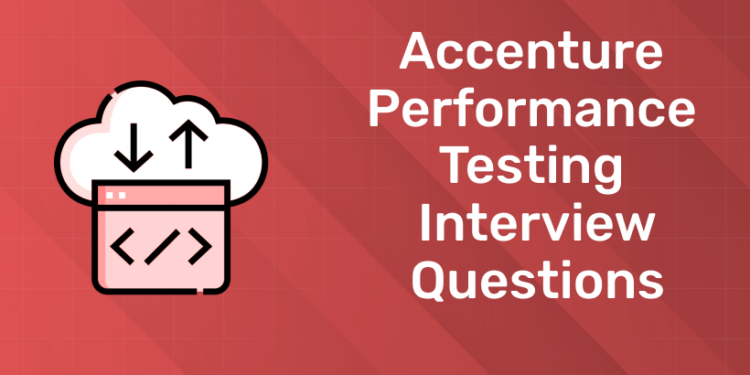Table of Contents
Performance testing plays a vital role in ensuring that software applications are reliable, scalable, and capable of handling expected workloads. For professionals aspiring to join Accenture—a global leader in consulting and technology services—mastering performance testing concepts is crucial. This blog is designed to help candidates with Accenture performance testing interview questions. Whether you are a beginner or an experienced professional, this guide will help you gain insights into the technical and practical aspects of performance testing, including tools like LoadRunner, JMeter, and others.
Learn Software Testing from QA Experts! Get Free Demo Classes Here!
Why Join Accenture?
Accenture is a globally recognized leader in consulting, technology, and business solutions, offering a dynamic work environment and endless opportunities for growth. Here are some compelling reasons to consider joining Accenture:
1. Innovative Work Environment:
Accenture thrives on innovation, leveraging cutting-edge technologies like AI, cloud, and blockchain. You’ll have the chance to work on ground breaking projects with global impact.
2. Career Development:
With structured learning programs, mentorship opportunities, and access to world-class training, Accenture ensures continuous professional development.
3. Diverse and Inclusive Culture:
Accenture values diversity and fosters an inclusive workplace where people from all backgrounds feel supported and empowered.
4. Global Opportunities:
With offices in over 120 countries, Accenture offers opportunities to work across different industries and geographies, enhancing both personal and professional growth.
5. Comprehensive Benefits:
Accenture provides competitive compensation packages, health benefits, flexible work arrangements, and wellness programs to ensure work-life balance.
Accenture Performance Testing Interview Questions and Answers
1: What is software testing?
Preparing for a performance testing role at Accenture requires a strong understanding of performance testing concepts, tools, and best practices. Below is a list of commonly asked interview questions and sample answers to help you succeed:
Basic Questions
1. What is performance testing?
Performance testing is a non-functional testing process that evaluates an application’s speed, scalability, and stability under a given workload. It ensures that the system meets performance benchmarks, such as response time, throughput, and resource utilization.
2. What are the different types of performance testing?
- Load Testing
- Stress Testing
- Endurance Testing
- Spike Testing
- Volume Testing
- Scalability Testing
3. What is the difference between load testing and stress testing?
Load Testing: Evaluates application performance under expected user loads.
Stress Testing: Tests the application under extreme or beyond-normal workloads to determine its breaking point.
Tool-Based Questions
4. Which performance testing tools are you familiar with?
I am proficient with tools like LoadRunner, JMeter, and Gatling. I have hands-on experience with scripting, executing test scenarios, and analyzing performance metrics in these tools.
5. What is correlation in LoadRunner?
Correlation is used to handle dynamic values in LoadRunner. It captures dynamic data generated during a session (like session IDs) and reuses it in subsequent requests to maintain session continuity.
6. How do you create a test plan in JMeter?
- Identify test scenarios and objectives.
- Define user behavior using samplers and controllers.
- Configure thread groups for virtual users.
- Set up timers, listeners, and assertions.
- Execute the test and analyze the results in listeners.
Advanced Questions
7. What metrics do you monitor during performance testing?
- Response time
- Throughput
- Error rate
- Concurrent users
- CPU and memory utilization
- Network latency
8. How do you identify performance bottlenecks?
By analyzing response times, monitoring server resource usage (CPU, memory, disk I/O), reviewing database queries, and using profiling tools to pinpoint code-level inefficiencies.
9. What is think time, and why is it important?
Think time is the pause or delay between user actions in a performance test. It simulates real-user behaviour and ensures that the test results accurately represent real-world usage scenarios.
10. How do you perform a stress test on a web application?
- Gradually increase the load beyond the expected user base.
- Monitor system performance to observe when it degrades or fails.
- Identify weak points in infrastructure or application code.
Scenario-Based Questions
11. If a test shows high response times, how would you troubleshoot?
- Analyze server logs to check for errors or delays.
- Monitor resource usage (CPU, memory, disk).
- Check network latency or bandwidth issues.
- Profile application code to identify inefficient queries or loops.
12. How would you handle a situation where the system crashes during testing?
- Analyze the crash logs to determine the root cause.
- Verify if the load was within the expected range.
- Reconfigure the test to isolate specific components causing the crash.
13. Explain how caching impacts performance testing.
Caching improves performance by reducing the load on backend systems. During testing, we may need to simulate scenarios with and without caching to evaluate real-world performance accurately.
Best Practices Questions
14. What are some best practices in performance testing?
- Define clear performance goals and SLAs.
- Use realistic test data and workloads.
- Conduct tests in an isolated environment.
- Monitor and validate test results with multiple tools.
- Perform regular testing to track performance trends.
15. How do you ensure scalability in an application?
Use stress and scalability tests to determine if the application can handle increased loads.
Optimize infrastructure, including load balancers and database configurations.
Ensure efficient use of resources like CPU and memory.
This set of questions and answers covers essential topics for Accenture’s performance testing roles. Preparing these thoroughly will help you approach the interview with confidence.
Conclusion
Joining Accenture means becoming part of a team that solves complex challenges, drives innovation, and creates meaningful change in the world. It’s more than just a job; it’s a career filled with purpose and possibilities.
Performance testing is a critical aspect of software development, ensuring that applications meet user expectations under varying workloads. For professionals aspiring to join Accenture, mastering performance testing concepts and tools is essential to excel in the interview process.
In this blog, we have covered key performance testing interview questions, ranging from basic concepts to advanced and scenario-based queries, along with best practices. By preparing these questions and understanding how to apply them in real-world scenarios, you can enhance your confidence and showcase your expertise during the interview.
Success at Accenture requires a combination of technical proficiency, problem-solving skills, and the ability to adapt to innovative tools and technologies. By honing these skills and staying updated on the latest industry trends, you’ll not only ace the interview but also thrive in your performance testing career at Accenture.
Good luck with your interview preparation!
Learn Software Testing from QA Experts! Get Free Demo Classes Here!












